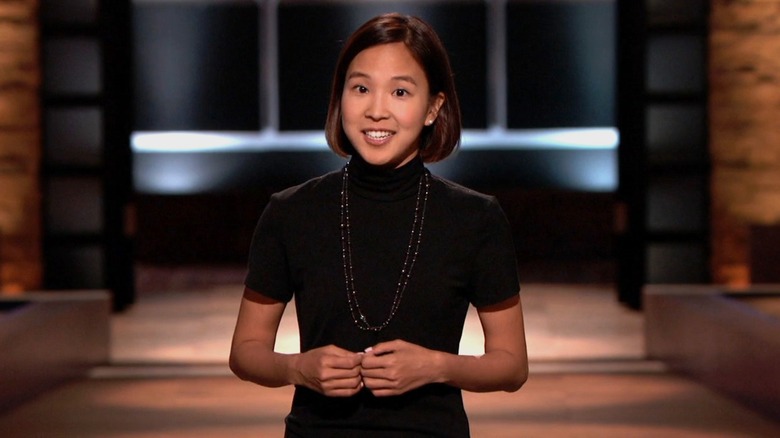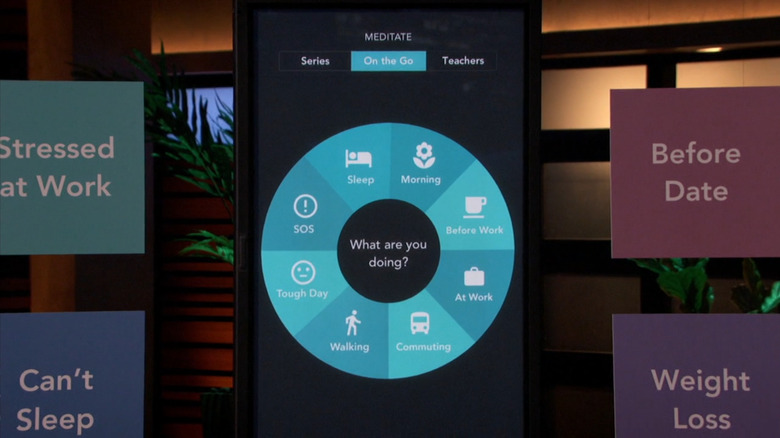Whatever Happened To Simple Habit After Shark Tank?
We may receive a commission on purchases made from links.
While we can all benefit from such practices as good sleep and meditation, everyone's path to mental wellness is different. Simple Habit aims to alleviate this and start people on the right track. The app not only has a wide range of instructors but also offers personalized meditation settings for various daily scenarios, from de-stressors for hectic workdays to chillouts on busy commutes and many more. The brief sessions give users an easy way of incorporating this beneficial practice into their daily lives.
Simple Habit is the brainchild of founder and CEO Yunha Kim. After graduating college, Kim worked as an investment banker on Wall Street before founding her first startup, Locket, at age 23. The world of entrepreneurship proved to be a stressful one for Kim, and she began teaching herself meditation to combat this. Kim wanted others to reap the same rewards from this practice and started looking into ways to assimilate meditation into people's daily lives. With this notion, she dropped out of her MBA studies at Stanford University to launch Simple Habit in 2016.
Even in these early stages, Kim and her company were on a roll. In December 2016, Simple Habit was launched out of the tech startup accelerator Y Combinator, which gave the app a series of new features and challenges for the new year. The team raised over $2.5 million in investments from such sources as Foundation Capital, New Enterprise Associates, and CEOs of companies such as Dropbox and Gusto. With such rapid growth, it's no wonder that Kim eventually found herself in front of a very different group of investors.
What happened to Simple Habit on Shark Tank?
Founder Yunha Kim entered "Shark Tank" Season 9 looking for a $600,000 investment for 5% of Simple Habit. The $12 million valuation was enough to get the sharks in a frenzy early on, but that was only the beginning of the segment's drama.
In under a year, Simple Habit brought in over 500,000 users and $750,000 in revenue, although it had yet to be a profitable venture. The app was showing great growth, however, having made $75,000 the previous month and being on track to hit $90,000 in the current. In the episode, Kim expressed hopes of reaching $5 million in revenue. While the app itself was free, certain practices could only be unlocked by premium subscribers.
After learning that the business still had $2.3 million saved from prior investments, some of the sharks grew confused, seemingly unsure what they're needed for. Kim explained that the sharks would provide great value with their planned business strategy, but Mark Cuban thought she was only there for the airtime and went as far as calling her a gold digger. Daymond John and Lori Greiner were of similar mindsets and both went out. Guest shark Richard Branson disagreed with the sentiment, believing that the tank should be welcoming to people from all backgrounds. Cuban remained contentious as Branson attempted to make a deal, leading to Branson tossing a glass of water in Cuban's face.
The shocking moment didn't stop deals from coming in, with both Branson and Robert Herjavec offering $300,000 for 10% each, equating to $600,000 for 20% equity. However, given the other stakeholders in the business, Kim couldn't value Simple Habit any less and exited the tank empty-handed.
Simple Habit after Shark Tank
Ironically, despite entering the show to pitch a mediation app, Simple Habit's segment birthed one of the most heated moments in "Shark Tank" history. In particular, Mark Cuban calling Yunha Kim a gold digger drew some controversy. Many deemed the comment as sexist and dismissive to the hard work Kim had put in to get on the show. Kim was similarly hurt by the name-calling, saying in an interview with Forbes, "I was shocked. I'd guess Mark had never called a male entrepreneur a gold digger. In retrospect, part of me wishes that I'd responded by calling out the inappropriateness of the term, but in the moment, I made a choice not to respond to his comment."
It wouldn't be the end of Simple Habit's dilemmas. The increased exposure from the episode's airing in October 2017, commonly referred to as the "Shark Tank" effect, saw Simple Habit receive 75,000 new downloads on the night of the broadcast, which grew to 1 million downloads by November. However, the app was also garnering some less desirable attention. Joe Burton, founder of the digital training platform Whil Concepts, Inc., released a public letter in Observer addressed to Kim and company, accusing them of stealing much of Simple Habit's business model and app features from other competitors. It's unknown if any response or action came from these accusations.
Nevertheless, it seemed to do little to halt Simple Habit's continuous growth. By 2020, the app had garnered over 7 million users. During the infamously tumultuous year, the team offered Simple Habit's premium features for free for all users who had been financially impacted by the pandemic.
Is Simple Habit still in business?
In March 2023, Simple Habit was sold to the spiritual wellness marketplace company Ingenio. Founder Yunha Kim has since pivoted her attention to her new app, Sleep Reset. The new app was started when it was discovered that a majority of activity on Simple Habit revolved around its sleep programs. Sleep Reset brings Cognitive Behavioral Therapy for Insomnia to the mobile space, partnering subscribers with a coach to aid in their sleep habits.
In a short amount of time, Sleep Reset has seen growth comparable to that of Simple Habit. The app has over 8,000 active subscribers, and in March 2023, it was on track to hit $1.86 million in revenue in its year. "In the nine months since we came out of beta, we've more than doubled our subscriber base and our revenue," Kim said in an interview with TechCrunch. "We've made updates to our program which have driven increased engagement and our efficacy data remains very strong, with the average program graduate reporting over an hour more of sleep per night, and 53% less time needed to fall asleep."
As for Simple Habit, the app remains readily available. Users can download it for free on the App Store and Google Play, where the program sports near-perfect reviews. The app and its founder have been honored with some prestigious honors over the years as a result, including Kim being listed as one of Forbes 30 under 30 innovators in consumer tech and Simple Habit receiving the 2018 Google Play Award for best well-being app. Currently, the company brings in an estimated annual revenue of $34 million, with a net worth of $20 million.
What's next for Simple Habit?
As Simple Habit finds its place under its new management, the future is looking bright. Even though much of Yunha Kim's energy has been dedicated to developing her new app, Sleep Reset, the acquisition of Simple Habit granted her a place on Ingenio's advisory board.
Speaking about the possibilities of Simple Habit, chief corporate development officer Bryan Leppi shared with TechCrunch that the app's many features have the potential to strengthen some of their existing programs. "Simple Habit will continue as a stand-alone product as well as a further wellness content layer for Ingenio's global brand footprint," he stated. "The meditation and audio wellness content from Simple Habit may be added to apps like Keen to expand access to healthy habit formation and balanced lifestyles." Keen, a psychic reading app, seems a solid fit with Simple Habit's meditative offerings.
As for Kim and her most recent endeavors, Sleep Reset has been showing some promising signs. A recent study conducted by the University of Arizona's Sleep and Health Research Program found that users averaged 44 increased minutes of sleep each night and 85 minutes for those starting the program who slept six hours or less. The results were considered especially significant, with experts deeming Sleep Reset as the first clinically proven digital sleep solution out there. The app also has a 4.8 rating out of 5 on the Apple store based on over 2,000 ratings, which is pretty impressive.
"Shark Tank" is available for purchase on Prime Video.




